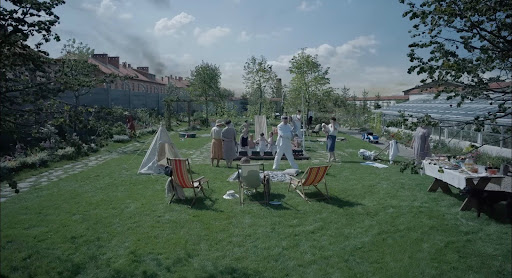
Best Picture nominee “The Zone of Interest” has finally expanded its limited theatrical run into a full nation wide release Jan. 26 due to the exorbitant buzz surrounding the film. Since its initial May. 19 screening at the Cannes Film Festival, the film has garnered a mysterious aura. With many critics calling it a masterpiece and stressing its importance especially in the modern world, now audiences everywhere can see it.
The almost nonexistent “story” of the film follows the Nazi Commandant in charge of the Auschwitz concentration camp. He struggles to balance his horrific work and maintain the Eden-like estate he has built up for his family just outside the walls of the camp.
The film comes from Jonathan Glazer who is known for this style of a stripped back narrative told in a very experimental way. Whether it be his debut “Sexy Beast,” — a heist movie where about 90 percent of the plot is bickering about not wanting to do the heist — or his maternally surreal psychological thriller “Birth.”
This latest film serves as a spiritual successor to his most popular work “Under The Skin” (2013), the nightmarish alien abduction/seduction story starring Scarlett Johannson. Just like that film, “The Zone of Interest” plants the ideas of evil and tragedy through a quiet meditation. However, instead of seeing evil through an alluring extraterrestrial, it is seen in the self proclaimed “King” and “Queen” of Auschwitz: Rudolf and Hedwig Höss.
Played brilliantly by Christian Friedel and Sandra Hüller respectively, these two characters are abhorrent human beings and not empathetic in the slightest. But through their very limited dialogue, it’s shown that evil is far more familiar than what could have ever been imagined. The way they act, the deeply intimate but unsettling suburban setting and the parents’ pursuit of a better life for their children is not at all dissimilar to each and every viewer. This comparison has been tough for audiences to grasp but it is essential in understanding evil and what could cause the tragedies portrayed on screen.
The cornerstone of this life for their family is the staggering estate just on the outskirts of Auschwitz. Łukasz Żal’s beautiful cinematography captures the vibrancy of the home, including Hedwig’s omnipresent garden and a number of unmanned cameras that make the home feel real and all reactions more raw. Żal makes the most of the exterior shots by aligning the frame to a perfect symmetry that would even make Wes Anderson jealous. Every character is evenly centered at all times and the image reaches every corner of the frame, making it impossible to escape what is shown on screen.
Like “Under The Skin,” Glazer relies on sound most with faint screams and gunshots haunting the backgrounds of most scenes, far more effective than showing any of the calamity occurring just on the other side of the wall separating the Höss family from Auschwitz. Frequent collaborator Mica Levi (who worked with Glazer on “Under the Skin” and on his short films “The Fall” and “Strasbourg 1518”) has also returned to compose the much-talked-about score for this film. Their score is scarcely used but feels like a massive punch to the face, disorienting the viewer and remains ringing in your ears days after seeing the film.
Aside from focusing on the Hoss family, the story infrequently cuts away to an eerie subplot that is completely interpretive and could have completely different explanations from every audience member. Glazer continues to push the boundaries of the audience’s imagination and patience, keeping audience members on their toes for the entire [insert runtime here] runtime.
There were several instances where a shot held for too long, or a sound continuously repeated. With this experimental style of filmmaking it’s clear that Glazer respects his audience; he isn’t going to spoon-feed any information and knows the viewers can figure out his film for themselves.
If a jarring, disturbing and at times confusing reflection on evil doesn’t sound like your type of film, that is okay because it certainly isn’t for everyone. But if you wish to be treated as an equal by an intelligent filmmaker, then “The Zone of Interest” cannot be recommended enough.








